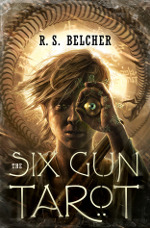
 In a blend of old and new, R.S Belcher’s The Six Gun Tarot brings an entertaining read. With an ensemble cast, Belcher draws reference from old world fantasy and mythology from many faiths and cultures blending all in an epic fashion. With a western setting, The Six Gun Tarot feels like a grand meld of Lovecraftian themes mixed with Neil Gaiman’s American Gods.
In a blend of old and new, R.S Belcher’s The Six Gun Tarot brings an entertaining read. With an ensemble cast, Belcher draws reference from old world fantasy and mythology from many faiths and cultures blending all in an epic fashion. With a western setting, The Six Gun Tarot feels like a grand meld of Lovecraftian themes mixed with Neil Gaiman’s American Gods.
Nevada, 1869: Beyond the pitiless 40-Mile Desert lies Golgotha, a cattle town that hides more than its share of unnatural secrets. The sheriff bears the mark of the noose around his neck; some say he is a dead man whose time has not yet come. His half-human deputy is kin to coyotes. The mayor guards a hoard of mythical treasures. A banker’s wife belongs to a secret order of assassins. And a shady saloon owner, whose fingers are in everyone’s business, may know more about the town’s true origins than he’s letting on.
A haven for the blessed and the damned, Golgotha has known many strange events, but nothing like the primordial darkness stirring in the abandoned silver mine overlooking the town. Bleeding midnight, an ancient evil is spilling into the world, and unless the sheriff and his posse can saddle up in time, Golgotha will have seen its last dawn…and so will all of Creation.
As the book opened, I was not altogether drawn to The Six Gun Tarot with it’s Western feel and landscape. However, Belcher proved it was worthy to follow along bringing in intriguing elements that referenced a span of cultures. From the onset, we are reminded that the United States in the 1800’s was a nation on the brink of change and a true clash of cultures. Belcher expertly plays on this theme with his array of characters and his storyline which stays true to the time period. This meld of cultures and religions made me truly enjoy the plot, be it the villains or the subtle character biases.
As in any book there are characters that are intriguing and other’s that are not. For me my least favorite was the opening character, Jim Negrey. This fifteen year old with a dark past shows many aspects of the time period, an innocence and naiveté combined with a sense of family honor and duty. However, something about this character was simply unlikeable. Perhaps it is because he both starts and ends the book yet does not manage to take a very large role. In fact I somewhat forgot about him during the bulk of the action and then remembered him vaguely as that boring kid from the opening. This is not necessarily what a character should be remembered for.
That being said I had not one but three favorite characters. This is a rarity for me and it is a true testament to how interesting and well developed Belcher’s characters are. Each of these characters is completely different but they share one commonality each of them exemplifies a harmony of true history, modern elements and fantasy themes. The first of these is a character named Mutt, a mixed race Native American deputy who finds that he rarely fits in until he finds a home in Golgotha, the town of people with a past. Even here his integrity is consistently questioned because of his racial makeup yet Mutt carries on and perseveres. He is able to ultimately go back to his roots to find the Native legends which tell of the entity which is plaguing the town. On the surface Mutt seems like a simple man but it is how he holds his cards close to his chest which really make him interesting.
The second character which I found to be intriguing is Harry, the polygamist Mormon mayor of Golgotha who has a predilection for having a male lover. Though Harry could be defined by all those things, what intrigues me the most was how he consistently battled between being selfish and his sense of honor. His biggest battle is against himself and it made him all the more interesting to read about.
The final character which made me truly grin was Maude, a strong women of the west tied into an epic society of female warriors, assassins and protectors. Need I say more to prove how awesome she is? The interesting thing for me apart from the obvious was that Maude battled with society, with how she willingly changed to play societies roles and found herself bitter and resentful yet eventually seeing that despite her past, her future was not set in stone.
The entirety of The Six Gun Tarot is not all positive. Belcher’s writing style lends itself to playing out several scenes simultaneously which can sometimes come across as muddled. Some of the dialogue can come across as dull and while Belcher has multicultural themes, there is a fine line between cliché and truth which is occasionally crossed. Despite all of this Belcher creates a world which is ultimately entertaining. His prose is clear and calls to mind a movie or game narrative. Not limiting himself to a specific genre, Belcher unabashedly presents his story as is and ultimately is better for it. The Six Gun Tarot is a good read for anyone who is willing to take the journey to a different kind of old west; mysterious and dark.
